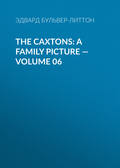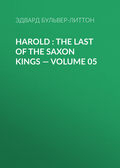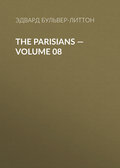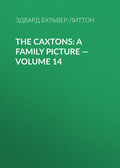
Эдвард Бульвер-Литтон
"My Novel" — Volume 08
CHAPTER VIII
"Br the Lord, Harry!" cried the squire, as he stood with his wife in the park, on a visit of inspection to some first-rate Southdowns just added to his stock,—"by the Lord, if that is not Randal Leslie trying to get into the park at the back gate! Hollo, Randal! you must come round by the lodge, my boy," said he. "You see this gate is locked to keep out trespassers."
"A pity," said Randal. "I like short cuts, and you have shut up a very short one."
"So the trespassers said," quoth the squire; "but Stirn insisted on it— valuable man, Stirn. But ride round to the lodge. Put up your horse, and you'll join us before we can get to the house."
Randal nodded and smiled, and rode briskly on. The squire rejoined his Harry.
"Ah, William," said she, anxiously, "though certainly Randal Leslie means well, I always dread his visits."
"So do I, in one sense," quoth the squire, "for he always carries away a bank-note for Frank."
"I hope he is really Frank's friend," said Mrs. Hazeldean. "Who's else can he be? Not his own, poor fellow, for he will never accept a shilling from me, though his grandmother was as good a Hazeldean as I am. But, zounds, I like his pride, and his economy too. As for Frank—"
"Hush, William!" cried Mrs. Hazeldean, and put her fair hand before the squire's mouth. The squire was softened, and kissed the fair hand gallantly,—perhaps he kissed the lips too; at all events, the worthy pair were walking lovingly arm-in-arm when Randal joined them.
He did not affect to perceive a certain coldness in the manner of Mrs. Hazeldean, but began immediately to talk to her about Frank; praise that young gentleman's appearance; expatiate on his health, his popularity, and his good gifts, personal and mental,—and this with so much warmth, that any dim and undeveloped suspicions Mrs. Hazeldean might have formed soon melted away.
Randal continued to make himself thus agreeable, until the squire, persuaded that his young kinsman was a first-rate agriculturalist, insisted upon carrying him off to the home-farm; and Harry turned towards the house; to order Randal's room to be got ready: "For," said Randal, "knowing that you will excuse my morning dress, I venture to invite myself to dine and sleep at the Hall."
On approaching the farm-buildings, Randal was seized with the terror of an impostor; for, despite all the theoretical learning on Bucolics and Georgics with which he had dazzled the squire, poor Frank, so despised, would have beat him hollow when it came to the judging of the points of an ox, or the show of a crop.
"Ha, ha," cried the squire, chuckling, "I long to see how you'll astonish Stirn. Why, you'll guess in a moment where we put the top-dressing; and when you come to handle my short-horns, I dare swear you'll know to a pound how much oil-cake has gone into their sides."
"Oh, you do me too much honour,—indeed you do. I only know the general principles of agriculture; the details are eminently interesting, but I have not had the opportunity to acquire them."
"Stuff!" cried the squire. "How can a man know general principles unless he has first studied the details? You are too modest, my boy. Ho! there 's Stirn looking out for us!" Randal saw the grim visage of Stirn peering out of a cattleshed, and felt undone. He made a desperate rush towards changing the squire's humour.
"Well, sir, perhaps Frank may soon gratify your wish, and turn farmer himself."
"Eh!" quoth the squire, stopping short,—"what now?"
"Suppose he were to marry?"
"I'd give him the two best farms on the property rent free. Ha, ha! Has he seen the girl yet? I'd leave him free to choose; sir, I chose for myself,—every man should. Not but what Miss Stick-to-rights is an heiress, and, I hear, a very decent girl, and that would join the two properties, and put an end to that law-suit about the right of way, which began in the reign of King Charles the Second, and is likely otherwise to last till the day of judgment. But never mind her; let Frank choose to please himself."
"I'll not fail to tell him so, sir. I did fear you might have some prejudices. But here we are at the farmyard."
"Burn the farmyard! How can I think of farmyards when you talk of Frank's marriage? Come on—this way. What were you saying about prejudices?"
"Why, you might wish him to marry an Englishwoman, for instance."
"English! Good heavens, sir, does he mean to marry a Hindoo?"
"Nay, I don't know that he means to marry at all; I am only surmising; but if he did fall in love with a foreigner—"
"A foreigner! Ah, then Harry was—" The squire stopped short.
"Who might, perhaps," observed Randal—not truly, if he referred to Madame di Negra—"who might, perhaps, speak very little English?"
"Lord ha' mercy!"
"And a Roman Catholic—"
"Worshipping idols, and roasting people who don't worship them."
"Signor Riccabocca is not so bad as that."
"Rickeybockey! Well, if it was his daughter! But not speak English! and not go to the parish church! By George, if Frank thought of such a thing, I'd cut him off with a shilling. Don't talk to me, sir; I would. I 'm a mild man, and an easy man; but when I say a thing, I say it, Mr. Leslie. Oh, but it is a jest,—you are laughing at me. There 's no such painted good-for-nothing creature in Frank's eye, eh?"
"Indeed, sir, if ever I find there is, I will give you notice in time. At present, I was only trying to ascertain what you wished for a daughter-in-law. You said you had no prejudice."
"No more I have,—not a bit of it."
"You don't like a foreigner and a Catholic?"
"Who the devil would?"
"But if she had rank and title?"
"Rank and title! Bubble and squeak! No, not half so good as bubble and squeak. English beef and good cabbage. But foreign rank and title!— foreign cabbage and beef!—-foreign bubble and foreign squeak!" And the squire made a wry face, and spat forth his disgust and indignation.
"You must have an Englishwoman?"
"Of course."
"Money?"
"Don't care, provided she is a tidy, sensible, active lass, with a good character for her dower."
"Character—ah, that is indispensable?"
"I should think so, indeed. A Mrs. Hazeldean of Hazeldean—You frighten me. He's not going to run off with a divorced woman, or a—"
The squire stopped, and looked so red in the face that Randal feared he might be seized with apoplexy before Frank's crimes had made him alter his will.
Therefore he hastened to relieve Mr. Hazeldean's mind, and assured him that he had been only talking at random; that Frank was in the habit, indeed, of seeing foreign ladies occasionally, as all persons in the London world were; but that he was sure Frank would never marry without the full consent and approval of his parents. He ended by repeating his assurance, that he would warn the squire if ever it became necessary. Still, however, he left Mr. Hazeldean so disturbed and uneasy that that gentleman forgot all about the farm, and went moodily on in the opposite direction, reentering the park at its farther extremity. As soon as they approached the house, the squire hastened to shut himself with his wife in full parental consultation; and Randal, seated upon a bench on the terrace, revolved the mischief he had done, and its chances of success.
While thus seated, and thus thinking, a footstep approached cautiously, and a low voice said, in broken English, "Sare, sare, let me speak vid you."
Randal turned in surprise, and beheld a swarthy, saturnine face, with grizzled hair and marked features. He recognized the figure that had joined Riccabocca in the Italian's garden. "Speak-a-you Italian?" resumed Jackeymo.
Randal, who had made himself an excellent linguist, nodded assent; and Jackeymo, rejoiced, begged him to withdraw into a more private part of the grounds.
Randal obeyed, and the two gained the shade of a stately chestnut avenue.
"Sir," then said Jackeymo, speaking in his native tongue, and expressing himself with a certain simple pathos, "I am but a poor man; my name is Giacomo. You have heard of me; servant to the signore whom you saw to-day,—only a servant; but he honours me with his confidence. We have known danger together; and of all his friends and followers, I alone came with him to the stranger's land."
"Good, faithful fellow," said Randal, examining the man's face, "say on. Your master confides in you? He has confided that which I told him this day?"
"He did. Ah, sir; the padrone was too proud to ask you to explain more, —too proud to show fear of another. But he does fear, he ought to fear, he shall fear," continued Jackeymo, working himself up to passion,—"for the padrone has a daughter, and his enemy is a villain. Oh, sir, tell me all that you did not tell to the padrone. You hinted that this man might wish to marry the signora. Marry her!—-I could cut his throat at the altar!"
"Indeed," said Randal, "I believe that such is his object."
"But why? He is rich, she is penniless,—no, not quite that, for we have saved—but penniless, compared to him."
"My good friend, I know not yet his motives; but I can easily learn them. If, however, this count be your master's enemy, it is surely well to guard against him, whatever his designs; and to do so, you should move into London or its neighbourhood. I fear that, while we speak, the count may get upon his track."
"He had better not come here!" cried the servant, menacingly, and putting his hand where the knife was not.
"Beware of your own anger, Giacomo. One act of violence, and you would be transported from England, and your mast'r would lose a friend."
Jackeymo seemed struck by this caution.
"And if the padrone were to meet him, do you think the padrone would meekly say, 'Come sta sa Signoria'? The padrone would strike him dead!"
"Hush! hush! You speak of what in England is called murder, and is punished by the gallows. If you really love your master, for Heaven's sake get him from this place, get him from all chance of such passion and peril. I go to town to-morrow; I will find him a house, that shall be safe from all spies, all discovery. And there, too, my friend. I can do what I cannot at this distance,—watch over him, and keep watch also on his enemy."
Jackeymo seized Randal's hand, and lifted it towards his lip; then, as if struck by a sudden suspicion, dropped the hand, and said bluntly, "Signore, I think you have seen the padrone twice. Why do you take this interest in him?"
"Is it so uncommon to take interest even in a stranger who is menaced by some peril?"
Jackeymo, who believed little in general philanthropy, shook his head sceptically.
"Besides," continued Randal, suddenly bethinking himself of a more plausible reason,—"besides, I am a friend and connection of Mr. Egerton; and Mr. Egerton's most intimate friend is Lord L'Estrange; and I have heard that Lord L'Estrange—"
"The good lord! Oh, now I understand," interrupted Jackeymo, and his brow cleared. "Ah, if he were in England! But you will let us know when he comes?"
"Certainly. Now, tell me, Giacomo, is this count really unprincipled and dangerous? Remember I know him not personally."
"He has neither heart nor conscience."
"That defect makes him dangerous to men; perhaps not less so to women. Could it be possible, if he obtained any interview with the signora, that he could win her affections?" Jackeymo crossed himself rapidly and made no answer.
"I have heard that he is still very handsome." Jackeymo groaned.
Randal resumed, "Enough; persuade the padrone to come to town."
"But if the count is in town?"
"That makes no difference; the safest place is always the largest city. Everywhere else, a foreigner is in himself an object of attention and curiosity."
"True."
"Let your master, then, come to London, or rather, into its neighbourhood. He can reside in one of the suburbs most remote from the count's haunts. In two days I will have found him a lodging and write to him. You trust to me now?"
"I do indeed,—I do, Excellency. Ah, if the signorina were married, we would not care!"
"Married! But she looks so high!"
"Alas! not now! not here!"
Randal sighed heavily. Jackeymo's eyes sparkled. He thought he had detected a new motive for Randal's interest,—a motive to an Italian the most natural, the most laudable of all.
"Find the house, Signore, write to the padrone. He shall come. I'll talk to him. I can manage him. Holy San Giacomo, bestir thyself now,— 't is long since I troubled thee!"
Jackeymo strode off through the fading trees, smiling and muttering as he went.
The first dinner-bell rang, and on entering the drawingroom, Randal found Parson Dale and his wife, who had been invited in haste to meet the unexpected visitor.
The preliminary greetings over, Mr. Dale took the opportunity afforded by the squire's absence to inquire after the health of Mr. Egerton.
"He is always well," said Randal. "I believe he is made of iron."
"His heart is of gold," said the parson.
"Ah," said Randal, inquisitively, "you told me you had come in contact with him once, respecting, I think, some of your old parishioners at Lansmere?"
The parson nodded, and there was a moment's silence.
"Do you remember your battle by the stocks, Mr. Leslie?" said Mr. Dale, with a good-humoured laugh.
"Indeed, yes. By the way, now you speak of it, I met my old opponent in London the first year I went up to it."
"You did! where?"
"At a literary scamp's,—a cleverish man called Burley."
"Burley! I have seen some burlesque verses in Greek by a Mr. Burley."
"No doubt the same person. He has disappeared,—gone to the dogs, I dare say. Burlesque Greek is not a knowledge very much in power at present."
"Well, but Leonard Fairfield—you have seen him since?"
"No."
"Nor heard of him?"
"No; have you?"
"Strange to say, not for a long time. But I have reason to believe that he must be doing well."
"You surprise me! Why?"
"Because two years ago he sent for his mother. She went to him."
"Is that all?"
"It is enough; for he would not have sent for her if he could not maintain her."
Here the Hazeldeans entered, arm-in-arm, and the fat butler announced dinner.
The squire was unusually taciturn, Mrs. Hazeldean thoughtful, Mrs. Dale languid and headachy. The parson, who seldom enjoyed the luxury of converse with a scholar, save when he quarrelled with Dr. Riccaboeca, was animated by Randal's repute for ability into a great desire for argument.
"A glass of wine, Mr. Leslie. You were saying, before dinner, that burlesque Greek is not a knowledge very much in power at present. Pray, Sir, what knowledge is in power?"
RANDAL (laconically).—"Practical knowledge."
PARSON.—"What of?"
RANDAL.—"Men."
PARSON (candidly).—"Well, I suppose that is the most available sort of knowledge, in a worldly point of view. How does one learn it? Do books help?"
RANDAL.—"According as they are read, they help or injure."
PARSON.—"How should they be read in order to help?"
RANDAL.—"Read specially to apply to purposes that lead to power."
PARSON (very much struck with Randal's pithy and Spartan logic).—" Upon my word, Sir, you express yourself very well. I must own that I began these questions in the hope of differing from you; for I like an argument."
"That he does," growled the squire; "the most contradictory creature!"
PARSON.—-"Argument is the salt of talk. But now I am afraid I must agree with you, which I was not at all prepared for."
Randal bowed and answered, "No two men of our education can dispute upon the application of knowledge."
PARSON (pricking up his ears).—"Eh?—what to?"
RANDAL.—"Power, of course."
PARSON (overjoyed).—"Power!—the vulgarest application of it, or the loftiest? But you mean the loftiest?"
RANDAL (in his turn interested and interrogative).—" What do you call the loftiest, and what the vulgarest?"
PARSON.—"The vulgarest, self-interest; the loftiest, beneficence."
Randal suppressed the half-disdainful smile that rose to his lip.
"You speak, Sir, as a clergyman should do. I admire your sentiment, and adopt it; but I fear that the knowledge which aims only at beneficence very rarely in this world gets any power at all."
SQUIRE (seriously).—"That's true; I never get my own way when I want to do a kindness, and Stirn always gets his when he insists on something diabolically brutal and harsh."
PARSON.—"Pray, Mr. Leslie, what does intellectual power refined to the utmost, but entirely stripped of beneficence, most resemble?"
RANDAL.—"Resemble?—I can hardly say. Some very great man—almost any very great man—who has baffled all his foes, and attained all his ends."
PARSON.—"I doubt if any man has ever become very great who has not meant to be beneficent, though he might err in the means. Caesar was naturally beneficent, and so was Alexander. But intellectual power refined to the utmost, and wholly void of beneficence, resembles only one being, and that, sir, is the Principle of Evil."
RANDAL (startled).—"Do you mean the Devil?"
PARSON.—"Yes, Sir, the Devil; and even he, Sir, did not succeed! Even he, Sir, is what your great men would call a most decided failure."
MRS. DALE.—"My dear, my dear!"
PARSON.—"Our religion proves it, my love; he was an angel, and he fell."
There was a solemn pause. Randal was more impressed than he liked to own to himself. By this time the dinner was over, and the servants had retired. Harry glanced at Carry. Carry smoothed her gown and rose.
The gentlemen remained over their wine; and the parson, satisfied with what he deemed a clencher upon his favourite subject of discussion, changed the subject to lighter topics, till, happening to fall upon tithes, the squire struck in, and by dint of loudness of voice, and truculence of brow, fairly overwhelmed both his guests, and proved to his own satisfaction that tithes were an unjust and unchristianlike usurpation on the part of the Church generally, and a most especial and iniquitous infliction upon the Hazeldean estates in particular.
CHAPTER IX
On entering the drawing-room, Randal found the two ladies seated close together, in a position much more appropriate to the familiarity of their school-days than to the politeness of the friendship now existing between them. Mrs. Hazeldean's hand hung affectionately over Carry's shoulder, and both those fair English faces were bent over the same book. It was pretty to see these sober matrons, so different from each other in character and aspect, thus unconsciously restored to the intimacy of happy maiden youth by the golden link of some Magician from the still land of Truth or Fancy, brought together in heart, as each eye rested on the same thought; closer and closer, as sympathy, lost in the actual world, grew out of that world which unites in one bond of feeling the readers of some gentle book.
"And what work interests you so much?" asked Randal, pausing by the table.
"One you have read, of course," replied Mrs. Dale, putting a book-mark embroidered by herself into the page, and handing the volume to Randal. "It has made a great sensation, I believe."
Randal glanced at the title of the work. "True," said he, "I have heard much of it in London, but I have not yet had time to read it."
MRS. DALE.—"I can lend it to you, if you like to look over it to-night, and you can leave it for me with Mrs. Hazeldean."
PARSON (approaching).—"Oh, that book!—yes, you must read it. I do not know a work more instructive."
RANDAL.—"Instructive! Certainly I will read it then. But I thought it was a mere work of amusement,—of fancy. It seems so as I look over it."
PARSON.—"So is the 'Vicar of Wakefield;' yet what book more instructive?"
RANDAL.—"I should not have said that of the 'Vicar of Wakefield.' A pretty book enough, though the story is most improbable. But how is it instructive?"
PARSON.—"By its results: it leaves us happier and better. What can any instruction do more? Some works instruct through the head, some through the heart. The last reach the widest circle, and often produce the most genial influence on the character. This book belongs to the last. You will grant my proposition when you have read it."
Randal smiled and took the volume.
MRS. DALE.—" Is the author known yet?"
RANDAL.—"I have heard it ascribed to many writers, but I believe no one has claimed it."
PARSON.—"I think it must have been written by my old college friend, Professor Moss, the naturalist,—its descriptions of scenery are so accurate."
MRS. DALE.—"La, Charles dear! that snuffy, tiresome, prosy professor? How can you talk such nonsense? I am sure the author must be young, there is so much freshness of feeling."
MRS. HAZELDEAN (positively).—"Yes, certainly, young."
PARSON (no less positively).—"I should say just the contrary. Its tone is too serene, and its style too simple, for a young man. Besides, I don't know any young man who would send me his book, and this book has been sent me, very handsomely bound, too, you see. Depend upon it Moss is the loan—quite his turn of mind."
MRS. DALE.—"You are too provoking, Charles dear! Mr. Moss is so remarkably plain, too."
RANDAL.—"Must an author be handsome?"
PARSON.—"Ha! ha! Answer that if you can, Carry." Carry remained mute and disdainful.
SQUIRE (with great naivete).—" Well, I don't think there's much in the book, whoever wrote it; for I've read it myself, and understand every word of it."
MRS. DALE.—"I don't see why you should suppose it was written by a man at all. For my part, I think it must be a woman."
MRS. HAZELDEAN.—"Yes, there's a passage about maternal affection, which only a woman could have written."
PARSON.—"Pooh! pooh! I should like to see a woman who could have written that description of an August evening before a thunderstorm; every wild-flower in the hedgerow exactly the flowers of August, every sign in the air exactly those of the month. Bless you! a woman would have filled the hedge with violets and cowslips. Nobody else but my friend Moss could have written that description."
SQUIRE.—"I don't know; there's a simile about the waste of corn-seed in hand-sowing, which makes me think he must be a farmer!"
MRS. DALE (scornfully).—"A farmer! In hobnailed shoes, I suppose! I say it is a woman."
MRS. HAZELDEAN.—"A WOMAN, and A MOTHER!"
PARSON.—"A middle-aged man, and a naturalist."
SQUIRE.—"No, no, Parson, certainly a young man; for that love-scene puts me in mind of my own young days, when I would have given my ears to tell Harry how handsome I thought her; and all I could say was, 'Fine weather for the crops, Miss.' Yes, a young man and a farmer. I should not wonder if he had held the plough himself."
RANDAL (who had been turning over the pages).—"This sketch of Night in London comes from a man who has lived the life of cities and looked at wealth with the eyes of poverty. Not bad! I will read the book."
"Strange," said the parson, smiling, "that this little work should so have entered into our minds, suggested to all of us different ideas, yet equally charmed all,—given a new and fresh current to our dull country life, animated us as with the sight of a world in our breasts we had never seen before save in dreams: a little work like this by a man we don't know and never may! Well, that knowledge is power, and a noble one!"
"A sort of power, certainly, sir," said Randal, candidly; and that night, when Randal retired to his own room, he suspended his schemes and projects, and read, as he rarely did, without an object to gain by the reading.
The work surprised him by the pleasure it gave. Its charm lay in the writer's calm enjoyment of the beautiful. It seemed like some happy soul sunning itself in the light of its own thoughts. Its power was so tranquil and even, that it was only a critic who could perceive how much force and vigour were necessary to sustain the wing that floated aloft with so imperceptible an effort. There was no one faculty predominating tyrannically over the others; all seemed proportioned in the felicitous symmetry of a nature rounded, integral, and complete. And when the work was closed, it left behind it a tender warmth that played round the heart of the reader and vivified feelings which seemed unknown before. Randal laid down the book softly; and for five minutes the ignoble and base purposes to which his own knowledge was applied stood before him, naked and unmasked.
"Tut!" said he, wrenching himself violently away from the benign influence, "it was not to sympathize with Hector, but to conquer with Achilles, that Alexander of Macedon kept Homer under his pillow. Such should be the true use of books to him who has the practical world to subdue; let parsons and women construe it otherwise, as they may!"
And the Principle of Evil descended again upon the intellect from which the guide of Beneficence was gone.







